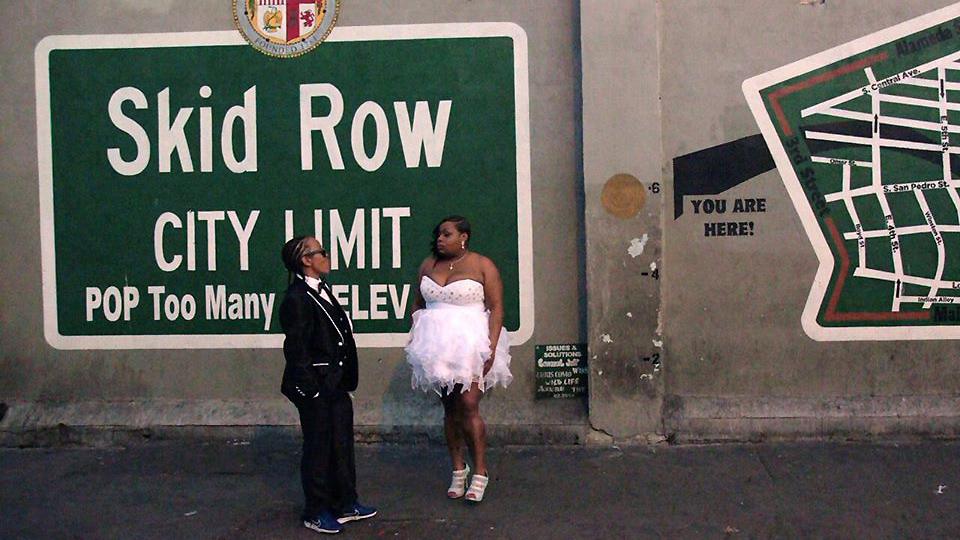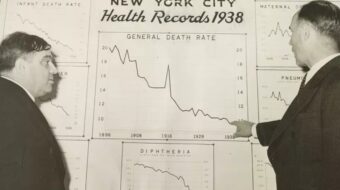
Homelessness and poverty have reached epidemic levels in the United States of America. As of 2017 an estimated 553,742 people experience homelessness on any given night in the nation. From 2016 to 2017, homelessness increased nationally by 0.7 percent. The state of California has 25 percent of the nation’s homeless population, with a reported 130,000 individuals living on the streets. At close to 70 percent, California has the highest percentage of unsheltered homeless individuals in the country. More specifically, in Los Angeles County there are more than 57,000 people who lack a steady place to sleep.
The infamous Skid Row of downtown Los Angeles, an impoverished area where homeless individuals set up camp on the sidewalks, has become a symbol of the state of homelessness in America: Thousands “reside” there from day to day.
The new documentary Game Girls gives viewers a slice of life look into the lives of a Black lesbian couple who are among those living on Skid Row. The unfiltered, and at times unsettling film forces us to acknowledge that the crisis of homelessness is not just faceless statistics.
The documentary follows couple Teri Rogers and Tiahna Vince as they navigate their relationship on Skid Row. Referred to often as the “homeless capital of the U.S.,” Skid Row is an area that Teri has been trying to move away from for some time. The couple, having been dating for close to seven months by the time of filming, deal with constant tension due to their different outlooks on their living situation. Tiahna seems comfortable being a player in the underground economy of Skid Row, while Teri is driven by a strong desire to get out. The film follows the process Teri goes through in order to secure housing outside the area, along with the trials and tribulations of the two living under a system that gives them few resources to fully escape poverty.
From the very beginning of Game Girls viewers are given an unglorified look into the lives of the couple. The opening scene has Teri drunk and belligerent in the streets, proclaiming to the camera, and the world, that she will “take on anyone” who dares to try to go against her. Her tirade is seemingly incoherent and aggressive, but it sets the tone for the film. The journey viewers are about to embark on with this couple won’t be polite, it won’t be neat, and it won’t hold back.
Scenes such as the angry opening are juxtaposed with quieter moments, such as Teri going to get Tiahna from jail. The two are reunited as Tiahna had been arrested for missing a probation check-in. Their reunion is tender and loving: It’s clear the two find some measure of joy in their company with one another. Yet, for every such moment, there are others of tension and argument, some that turn physical. Often these occasions are fueled by Teri’s alcoholism or disagreements over their living situation. Both the quieter and the rougher moments show the life of this couple as complex and layered.
The couple also exists in a system that can seem like a minefield to maneuver in, in order to secure a better way of life. Teri and Tiahna rarely talk directly to the camera, yet scenes showing Teri going to her government appointments give a glimpse into the uphill battle she has to go through in order to secure housing outside of Skid Row. When filmmaker Alina Skrzeszewska focuses on these moments we see that the system often fails women in Teri’s predicament.
We learn through group therapy sessions that Teri and Tiahna, and many of the women in their group, come from troubled, abusive backgrounds. These women, majority of color, predominantly Black, felt like they had no choice but to live on the streets and fend for themselves. In addition, Teri deals with mental illness that doesn’t often allow her to hold down a steady job. Coupled with the overly strict rules on obtaining the proper medication to treat her illness, viewers can see that, just as Teri’s social worker makes plain in the film, “the system is broken.”
Despite the bleak environment of Skid Row, this community doesn’t exist separate and apart from the rest of the world. The film follows a Black Lives Matter protest that emphasizes the tragic fact that the face of homelessness is Black and low-income, and increasingly LGBTQ. Recent reports state that in Los Angeles, although Black people are nine percent of the general population, they are over thirty-nine percent of the homeless population. A report by the LGBT Task Force explains that between 20 and 40 percent of homeless youth identify as lesbian, gay, bisexual, or transgender. Teri and Tiahna exist in all of these intersectional categories, giving a face to the crisis that is often ignored in the United States.
There are a number of strong points in the film. One is that we are able to hear the thoughts of Teri and Tiahna on what they have to do to survive. These women don’t want the world to feel sorry for them; rather they want to share their story. Another strength is allowing the viewers to peer into the kind of assistance the homeless receive, and the problems of it. This is especially important given that as of June 2018 an additional 600 million dollars was allotted in the California State Budget to address homelessness, but the film makes clear that the process is imperfect and lacking.
Game Girls humanizes an issue that has reached critical mass. The current White House administration believes raising rents will somehow force low-income individuals to be more “self-sufficient,” when in reality for many low-income working people, who already spend half or more of their paychecks on rent alone, there is a thin line between having a roof over their heads and being out on the streets. With rents rising and wages not catching up, many more may soon find themselves in Teri and Tiahna’s predicament.
The documentary unspools a harsh reality, asking the viewer to take in the good, the bad, the love and the hate. It’s a picture of tragedy and resilience that will make you uncomfortable, but is a necessary contribution to bringing the problem of homelessness out from the shadows, and giving a voice to those whose stories need to be told.
The documentary will premiere at Outfest Los Angeles on July 22.
Like free stuff? So do we. Here at People’s World, we believe strongly in the mission of keeping the labor and democratic movements informed so they are prepared for the struggle. But we need your help. While our content is free for readers (something we are proud of) it takes money — a lot of it — to produce and cover the stories you see in our pages. Only you, our readers and supporters, can keep us going. Only you can make sure we keep the news that matters free of paywalls and advertisements. If you enjoy reading People’s World and the stories we bring you, support our work by becoming a $5 monthly sustainer today.












Comments